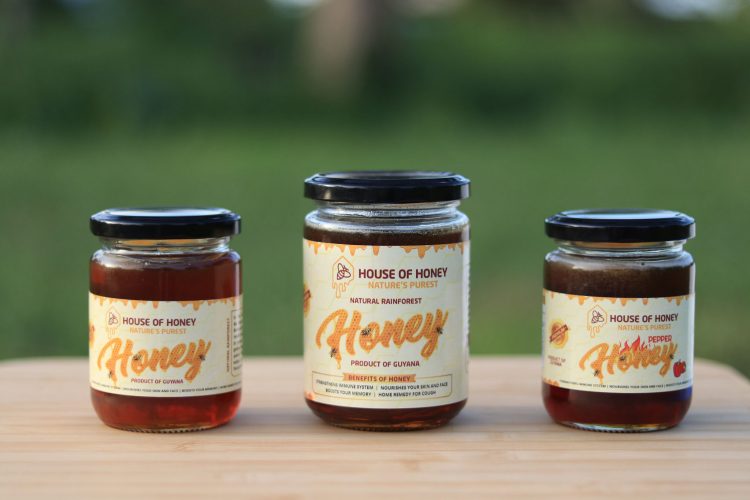Trinidad and Tobago is working to amend archaic laws which will finally allow Guyana’s honey to transit the twin-island republic after years of fruitless deliberations at CARICOM’s trade council.
Foreign Affairs and International Cooperation Minister, Hugh Todd told the Sunday Stabroek that Trinidad has committed to revising its trans-shipment laws to be more compliant with the CARICOM Single Market and Economy (CSME) framework.
Trinidad’s Minister of Trade and Industry, Paula Gopee-Scoon last week said “things are progressing” when contacted by this newspaper on the matter. She explained too that they have been in contact with the Guyanese government as they aim to address the issue.

At the CARICOM Council for Trade and Economic Development (COTED) meeting in Georgetown in May 2018, Trinidad had undertaken to enact legislation to facilitate the movement of honey.
Then Chairman of the committee, Antigua and Barbuda Minister of Trade, Commerce and Industry, Chet Greene had said that Guyana and Grenada were among CARICOM countries that stood to benefit from the export of honey via T&T once the legislation is in place to facilitate the trade in honey.
According to T&T’s current law, honey originating elsewhere than any of the territories in the Windward and Leeward Islands shall not be trans-shipped in Trinidad and Tobago.
“No honey arriving in Trinidad and Tobago by sea or by air shall be transhipped except as provided in this regulation…Honey originating in any of the above-mentioned territories may be transhipped in the harbour of Port-of-Spain under the authority of a permit issued by the Inspector and subject to the following provisions of this regulation… No honey shall be brought or kept ashore or within one mile of the shore during transhipment or pending loading on the outgoing vessel… No honey shall be unloaded or loaded or otherwise moved during transhipment except in the presence of and in accordance with the directions of an inspecting officer…No honey shall be unloaded for transhipment if the containers thereof are leaky or likely to leak, and, in such case or when the damaged containers are discovered after being unloaded; the inspecting officer shall take such measures or give such orders as may be reasonable and necessary in order to prevent any bees feeding upon any honey leaking or which may leak out of any containers,” the country’s Beekeeping and Bee Products Act of 1935 states.
The act also states that “no honey arriving in Trinidad and Tobago in any vessel or aircraft from places overseas whether for transhipment or not shall in any circumstances be brought ashore from such vessel or removed from such aircraft on a land aerodrome.”
Trade barrier
Todd told this newspaper that both Georgetown and Port-of-Spain are working collaboratively to bring an end to this decades-old trade barrier.
He explained that from both ends a technical report has been prepared. The report will be shared in due process.
Honey producer, Lance Hinds of House of Honey recently shed light on the Trinidad hurdle that honey producers face.
He stated that there is a large opening in the export market for honey but the current barrier in place prevents Guyanese honey producers from tapping into it. Hinds said that he has been receiving small orders and interest from customers in different countries. However, he is not able to meet all of his customers’ needs due to the barriers in place.
According to data he provided in a letter to this newspaper “Honey has the potential to be a significant revenue earner in the coming years. The global honey market was $USD 7.84 billion in 2020 and is forecast to grow from $8.17 billion in 2022 to $11.88 billion in 2028 at a CAGR of 5.5% in forecast period, 2021- 2028.”
A statement from the Ministry of Agriculture, had reported Minister of Agriculture Zulfikar Mustapha back in January announcing that the honey industry will be high on the government’s agriculture development agenda for 2023.
Despite somewhat unfavourable weather conditions in 2022, Guyana was able to maintain its honey production levels.
“Although we experienced a lot of rain last year which is known to have an impact on how bees are able to maneuver thus ultimately affecting honey production, we were able to maintain our overall honey production level, having produced over 3,700 gallons of honey in 2022. There was no decline,” the Minister was quoted as saying, as he acknowledge the steady production was as a result of more hives and apiculturists working in 2021.
“More people have expressed an interest in becoming apiculturists and we’ve been able to assist them with training. Last year, the GLDA was tasked with developing a comprehensive plan for the industry and has commenced working with new and existing beekeepers so that they can either establish or expand their operations. This will continue in 2023,” the minister said.
Hinds lamented that even though Trinidad offers connectivity to many markets, producers are not able to benefit from that opening as the country does not permit its ports to be used as a transhipment hub for honey.
“There are vast opportunities out there not only to tap into new markets but investor and partnerships. The ban is a risk to these opportunities. We need a middle ground… if they can allow for the honey to pass through…” he said.
He is calling for the matter to return to the COTED agenda at its scheduled meeting in April in a bid to fast track the commitment by Trinidad.
“Despite over 15 annual meetings of the Council on Trade and Economic Development (COTED) and numerous public declarations by our Caribbean leaders about lifting intra-regional trade barriers, 2023 still finds us with the challenge of being unable to ship honey from Guyana via our beloved CARICOM sister the Republic of Trinidad of Tobago. This is nothing short of a regional disgrace,” penned Hinds in a Letter to the Editor, published late last month.
Clear violation
He said that the position of Trinidad & Tobago is a clear violation of the fair trading principles of the Revised Treaty of Chaguaramas and the deafening silence that can be viewed as an insult.
The honey producer posited in the letter that despite facing this violation, “our Trinidadian brethren come into Guyana, set up, and happily conduct business with very minimal conditions. I believe some entities have been here since the 1970s if not before. We however have to put up with this continued obdurate stance by Trinidad and Tobago.”
“The ask is for in-transit facilities. Nothing else. Can you however imagine the wailing, gnashing of teeth not to mention the fire and brimstone if we applied similar policies? Nobody else ent shy when dey vex,” he lamented while calling out the Caribbean Private Sector Organization (CPSO) for failing to add its voice to this matter.
According to reports, In 2012, a portion of Grenada’s honey was confiscated, while a US$3,000 fine was imposed on Guyanese company Laparkan in 2015 for coming within one mile of the island’s shores.
At the signing of a Memorandum of Understanding back in 2018 between Guyana and Trinidad on Energy cooperation, then Agriculture Minister of Trinidad and Tobago Clarence Rambharat had said “Honey is a particularly sensitive area,” when asked why his country has never amended its legislation for trade in honey.
“We have committed to have another look at the law to see if we could create that environment in which we could allow in transit, once it does not stay in the country….” he said.
One of the reasons why the country has been very slow in allowing honey from outside, he said, “is because so far Trinidad and Tobago has been able to maintain its honey, disease-free.”
Background
The Ministry of Foreign Affairs and International Cooperation yesterday issued a statement providing background on the honey barrier in Trinidad.
It said that over the past years, Guyana and other CARICOM states have been faced with challenges to gain effective market access for honey via Trinidad.
The ministry noted that Grenada took the matter before COTED as far back as 2013. COTED considered the issue and decided that the act of Trinidad & Tobago denying market access to honey of regional origin was in breach of the provisions of the Revised Treaty of Chaguaramas. The ministry said that COTED directed Trinidad to lift the prohibition and allow regional honey into their market and/or facilitate its trans-shipment to other markets, like for the case of Guyana. Since then, the issue of market access for honey has remained on the COTED Agenda and the regional Ministers responsible for Trade and Economic Development have consistently found that Trinidad remained in breach of the Revised Treaty and the Decisions of the COTED on the matter.
The matter was also considered at the 104th Special Meeting of the COTED- Agriculture, held in July 2022 and at the 55th COTED in November 2022. The Ministers at both meetings restated previous decisions of the COTED that Trinidad remained in breach of previous decisions of the COTED, the Conference of Heads and its obligations under the Revised Treaty of Chaguaramas. The Ministers requested Trinidad to immediately take the necessary action to legislatively and administratively provide for the market access for honey of Community Origin. A request was also made to the Caribbean Agriculture, Health and Food Safety Agency (CAHFSA), working along with Grenada and Trinidad and Tobago, to finalise the Risk Assessment Report on Honey from Grenada for presentation to the next Regular Meeting of the COTED, the ministry said.
Although Guyana never formally tabled its concerns regarding trans-shipment before COTED, the ministry said that Georgetown has always strongly supported Grenada; and made known to COTED its own concerns. Any breakthrough at COTED would automatically benefit Guyana with regard to trans-shipment of honey through Trinidad & Tobago, it said.
Guyana also opted to engage Trinidad at a bilateral level by way of consultation and discussion of the issue at the Ministerial level. In January 2021 Guyana convened a virtual Joint Ministerial Trade and Agricultural Meeting with Trinidad to discuss market access difficulties experienced by Guyana when exporting to Trinidad.
With the COTED framework in mind and the bilateral engagements being undertaken by the two countries, the ministry said that Trinidad reported to the 55th COTED that legislative measures were being undertaken to revise the relevant laws so that regional apiary products are allowed into the country. Based on that report it is expected that the legislative process will be finalised in 2023, the ministry added.









